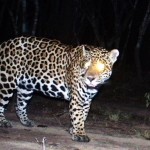
The park is also home to the jaguar, the mysterious spotted cat of the jungle that once roamed from the southwestern U.S. through Argentina. Jaguars have lost swaths of forest habitat to ranchland, farmland, and illegal logging, and they’re often shot by people who fear them (even though jaguars very rarely attack humans) or who worry that the cats will kill their cattle (which they sometimes do). And now jaguars are facing a new threat: poaching for the illegal trade in wildlife.
Ancient European homes had ‘invisible’ social complexities, bones reveal
Nowhere, perhaps, is this threat more evident than in Bolivia, where postal service employees have confiscated hundreds of jaguar teeth being smuggled to China. In separate court cases, two Chinese men are being tried on charges related to jaguar trafficking. And in towns across northern Bolivia, radio stations air advertisements by men with Chinese accents offering to buy jaguar parts from local people.
Hunting jaguars, as well as buying, selling, and even possessing jaguar parts, is illegal in Bolivia and has been for years. So is trading in jaguar parts commercially across international borders. But in Bolivia it’s often easy to get away with. Law enforcement is weak, and the price of teeth is high—sometimes $100 to $200 a tooth.







Social Profiles